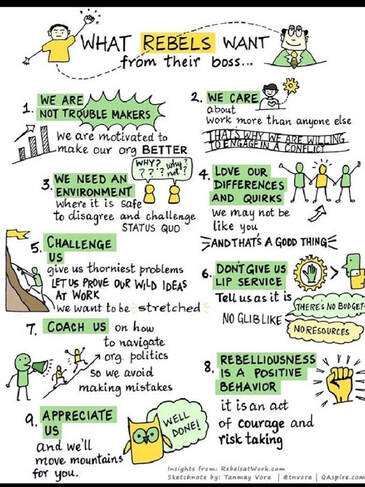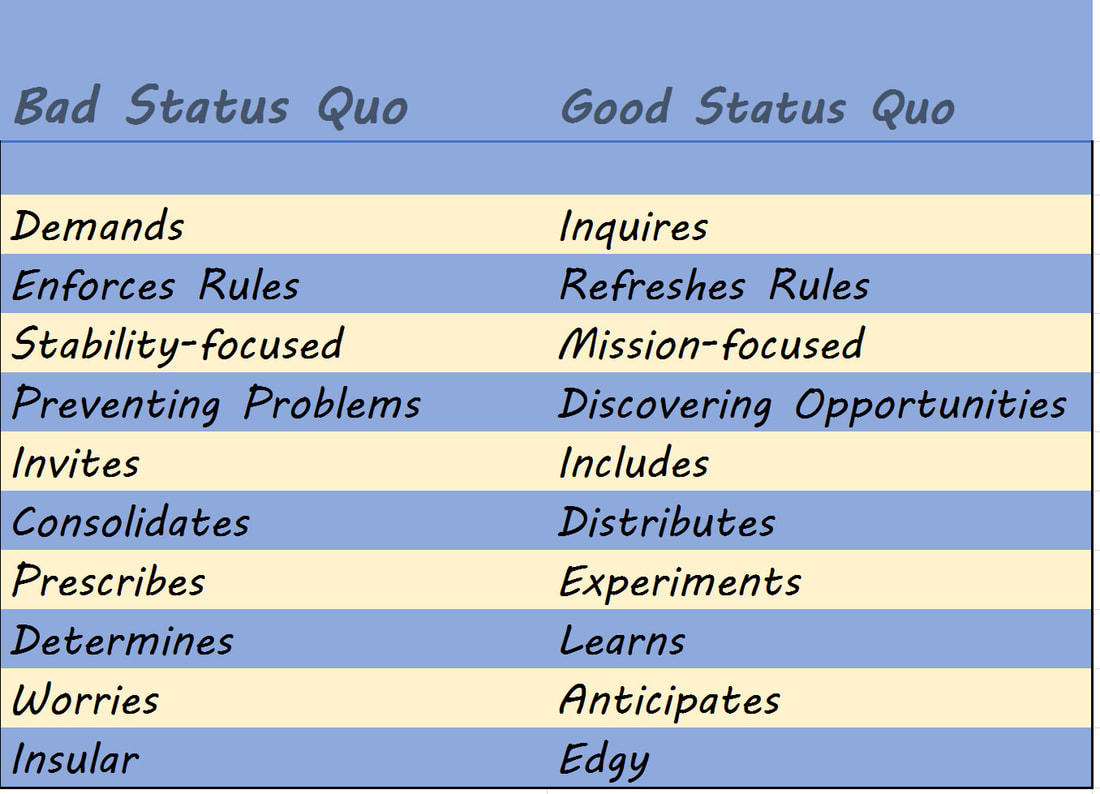Tempered Radicals |
Tempered radicals are change agents who want to work within the existing system without selling out.
|
Their personal values are often at odds with those of the dominant culture, so they feel a tension between staying true to their selves while living outwardly conventional lives. They choose to rock the boat while staying in it.
Everyday Leadership of Tempered Radicals"a set of attributes about “everyday leadership” so that “radical learners” can be even more effective in using their unique talents and perspectives to serve students and their school communities."
Link to article
|
Tempered radicals bear no banners; they sound no trumpets.
- Their ends are sweeping, but their means are mundane.
- They are firm in their commitments, yet flexible in the ways they fulfill them.
- Their actions may be small but can spread like a virus.
- They yearn for rapid change but trust in patience.
- They often work individually yet pull people together.
- Instead of stridently pressing their agendas, they start conversations. Rather than battling powerful foes, they seek powerful friends.
- And in the face of setbacks, they keep going.
- To do all this, tempered radicals understand revolutionary change for what it is — a phenomenon that can occur suddenly but more often than not requires time, commitment, and the patience to endure.
What kind of rebel are you?Francesca Gino has posted a short quiz to help you learn which type of rebel you tend to be. You'll get some tips on how you can further develop your rebel talents.
Take the quiz here . |
Rebel leadershipRebel leadership comes down to eight principles. Harvard behavioral scientist Francisca Gino found that most rebels share five core strengths: novelty, curiosity, perspective, diversity, and authenticity.
Seeing the possibilities of workplaces transformed through the strengths of rebel talent, Gino offers up eight refreshing steps to move in the direction of a rebel leadership style. 1. Break away from the routine. When you purposely seek out new and novel ideas and strategies, you find new inspiration where routine and traditions exist. 2. Seek out differences of opinion. Rather than listen to the opinions of people who think like you, rebels fight that instinct and find ways to steer some conflict or encourage disagreement. 3. Use the conversational technique of "plussing." "Rebels are willing to keep their minds open," and they're keen on keeping conversations going by expanding upon the thought, such as saying, "yes, and..." rather than "yes, but...." -- a technique called "plussing." In plussing, the point is to "improve ideas without using judgmental language." "This encourages a collaborative attitude. Someone else might jump in and add her own plus." 4. Display your authenticity in full view.Rebel leaders "don't hide who they are, or pretend to know, or be something that they are not." When you reveal yourself -- strengths and weaknesses alike -- you gain respect and status in the eyes of others. 5. Learn everything-- then forget everything. Successful rebels understand the importance of mastering their trade, but never allow themselves become slaves to the rules. "They have a deep understanding of what's there, and that's the basis that allows them to transform and create." 6. Find freedom in constraints."Rebels work through the constraints, and, if anything, the constraints become a source for thinking differently about the problem." 7. Lead from the trenches. Rebel leaders aren't afraid of getting down and dirty and often don't see themselves as higher than others due to their position and status. 8. Know the value of a happy accident.Gino found that sometimes happy accidents are actual accidents that successful rebels turned into something wonderful. Link to Full article- Inc.com |
Is status quo hindering progress"You can’t operate as a good rebel within an obdurate Status Quo. And you can’t be a plucky innovator if your hierarchy doesn’t care to experiment with new ideas."
For more on this topic, read Carmin Medina's blog at Rebels At Work. https://www.rebelsatwork.com/blog/2019/12/30/bad-status-quo-good-status-quo |


